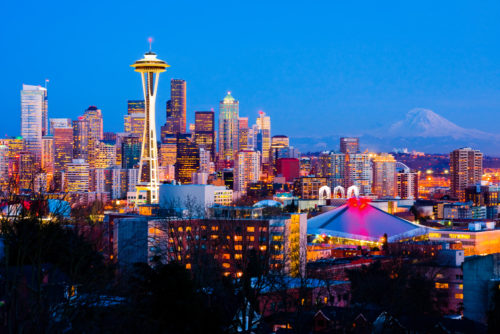Washington State has made some substantial changes to the state minimum wage over the years, although some of these changes have not gone into effect yet. Washington’s minimum wage is a great deal higher than the federal minimum wage of $7.25 per hour, and it will continue to increase.
Table of Contents
2020 Minimum Wage in Washington: $13.50
There are certain exceptions under which a person may not earn the full minimum, but by state minimum wage law, employers in Washington must pay employees over the age of 16 at least $13.50 per hour. This applies to agricultural and non-agricultural workers alike.
In the history of the Washington minimum wage, the state’s journey toward the $13.50 minimum wage began in 1998. That year, citizens voted for the Labor and Industries (L&I) Department to change the minimum wage each year based on the cost of living. This yearly adjustment went into effect until 2016, when the rate hit $9.47 per hour.
In 2016, voters decided in favor of Initiative 1433, which set the wage at $11 per hour in 2017, $11.50 in 2018, $12 in 2019, and $13.50 in 2020. In 2021, Initiative 1433 stipulates that the state will continue changing the minimum wage annually based on the federal Consumer Price Index for Urban Wage Earners and Clerical Workers (CPI-W), which is tied to the rate of inflation.
Additionally, there are other facets of the Washington minimum wage that make it unique.
Tipped: $13.50
The minimum wage for tipped employees is $13.50 per hour. In some states, employers can count tips as credits to help them meet the federal minimum wage requirement. In Washington State tip credits are not legal, rather employees who earn tips also qualify for the minimum wage. These employees include servers, bartenders, bussers, bellhops, and anyone else who earns tips.
Weekly: $540
The weekly minimum wage for employees who work for 40 hours is $540. The state set up the weekly minimum wage requirement so that salaried employees or those who work on a piecemeal basis (payment for task completed) don’t end up making less money than they would if the nature of their employment qualified them for an hourly wage.
Annually: $28,080
The yearly minimum wage for salaried or piece work employees is $28,080. This applies to workers who work for 40 hours each week. This is the pre-tax amount.
Overtime: $20.25
Overtime pay is 1.5 times the minimum wage for any hours an employee works over 40 hours in a seven day week; this equals out to $20.25 per hour. Employees who qualify for the minimum wage also qualify for overtime pay. If an employee is exempt from Washington’s Minimum Wage Act, they’re in the same boat as employees who don’t qualify for overtime pay based on the nature of their job.
Seattle Minimum Wage: $13.50 or $16.39
In 2014, Seattle voted to raise the minimum wage continually until 2020. The city’s current minimum wage went into effect on January 1, 2020. Seattle’s municipal ordinance established a different minimum wage for large and small businesses, and created an exception for small businesses, allowing them to factor employee health insurance coverage or tips into the wage.
- Hourly: $13.50 per hour for employees of small businesses with 500 or fewer employees; if small employers pay $3 per hour towards employee health insurance, they can factor that into the wage, meaning these employers pay $13.50 per hour in cash wages. Employers with over 500 employees must pay employees $16.39 per hour, and the health insurance exception does not apply to them.
- Tipped: Small businesses with 500 or fewer employees can pay employees who earn tips $13.50 per hour if those tips equal at least $3 per hour.
- Weekly (if full time): $540 for small employers; $655.60 for large employers.
- Annual (if full time): $28,080 for small employers; $34,091.20 for large employers.
Contract workers don’t qualify for the Seattle minimum wage, but, as of 2020, domestic contractors do. Employers can pay employees who are under the age of 16 an hourly wage equal to 85% of the Seattle minimum.
SeaTac Minimum Wage: $16.34
The City of SeaTac (located midway between Seattle and Tacoma) has its own minimum wage for hospitality and transportation workers. In 2013, the King County Superior Court ruled that these workers must receive a wage commensurate with the cost of living in the city. Since then, the city has continued to calculate increases to minimum wage rate for hospitality and transportation workers based on the rate of inflation.
- Hourly: $16.34 per hour for all employees who work for more than 80 hours in a year in Tacoma (except for a few uncommon exceptions).
- Tipped: $16.34 per hour for all tipped employees who work for more than 80 hours in a year; tip credits are not allowed.
- Weekly (if full time): $653.60 per week.
- Annual (if full time): $33,987.20 per year.
Tacoma Minimum Wage: $13.50 per hour
In 2015, the City of Tacoma decided on its own minimum wage increase schedule, which differs from the State of Washington’s schedule. The city’s minimum wage went from $10.35 per hour in 2016, to $11.15 in 2017, to $12 in 2018, and increased again in 2019.
As of 2020, however, Tacoma will abide by the state determined minimum wage of $13.50 an hour.
Washington State Minimum Wage: Soaring Above the Federal Rate
Washington State’s 2020 minimum wage rate of $13.50 per hour is $6.25 higher than the federal rate of $7.25. Moreover, federal law states that employees in states with a higher minimum wage than the federal rate must receive the higher rate.
There are, however, some exceptions to the minimum wage requirement in Washington. The state’s minimum wage applicability document designates many of the exceptions, and the L&I page on paying certain workers less than the minimum wage covers the rest. Some employees who are exempt from the state minimum wage act (MWA) include:
- Agricultural “hand harvest” pieceworkers who worked for less than 13 weeks in the preceding year and who commute to the farm where they’re employed;
- White collar workers employed in executive, administrative, professional, and outside sales positions;
- Student workers who are employed part-time to defray some of their school expenses;
- Contractors;
- Workers with disabilities whose earning capacity is impaired.
Washington Minimum Wage Increase News
Minimum wage in Washington state will continue increasing annually based on the rate of inflation.
In Seattle the minimum compensation requirement will no longer apply by 2025. This means small businesses who must pay a minimum compensation of $12 per hour to employees who receive $3 per hour in additional compensation (in the form of tips or healthcare coverage) will have to start paying their employees the Seattle minimum wage instead of the minimum compensation amount. In the meantime Seattle will maintain a gradual increase in minimum wage, continuing with $15 an hour in 2021.
Image Source: https://depositphotos.com/





